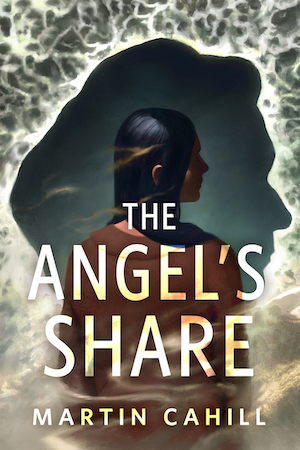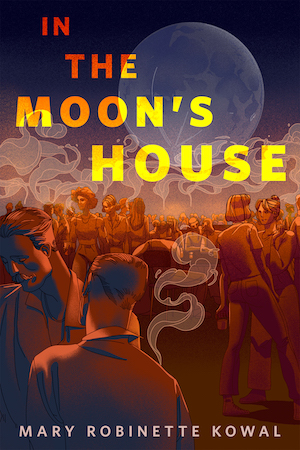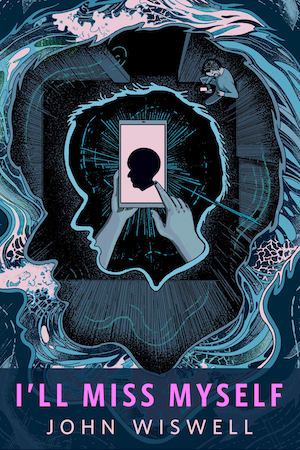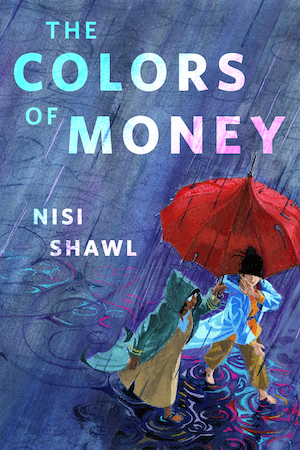An omnipresent figure in speculative fiction is the extraordinary, heroic child, or the ordinary child who goes to extraordinary places and does heroic things. It’s not hard to understand why. A tremendous number of us grew up in uncomfortable circumstances, dealt with major social awkwardness, probably bullying, shunning, and the feeling that we didn’t belong and didn’t know how to do so. Imaginative children usually don’t have the easiest time of it. Very few children do, but some clearly have a harder time than others.
It’s in so many of our stories. Because of our imaginativeness, we took some of the very things that were making our lives difficult and we made use of them as coping devices. When the world around me was unbearable, I read stories and I told myself stories of my own.
This is how so many of us survive.
What’s important to understand about this particular mode of survival—often labeled “escapism”—is that it’s not only about escaping the unbearable present; it’s about imagining a future where things are bearable and where, in some way, we’re more than we are. It’s a promise: things won’t always be like this. Things might get better. Hell, things will get better. Hang in there. Be strong.
They don’t see you for what you are. But you are.
This is only one reason why we say representation is so important. If no one like you is in any of these other worlds, what does that say about who and what it’s possible for you to be? How are you supposed to imagine a future where you’re absent?
It’s about possibility. It’s about the ability to imagine the finish line, to imagine yourself reaching it. Run the race, even if it’s utterly miserable and difficult beyond what you ever thought you could handle, because there might be an end.
Even more, you can imagine yourself running at all.
* * *
No one I know is okay right now.
We haven’t been okay for a while. For many of us, this experience of not-okay began a long time before the recent election. For many of us, not being okay has been the baseline along which life itself is experienced, the result of living in a world where every important element of the social world is organized to oppress and dominate marginalized people. But there’s a general sense that what’s going on right now, in the U.S. and elsewhere, is something new. It’s bigger, it’s more powerful, it’s farther-reaching. In some ways it’s merely a more obvious manifestation of what was already there. But that’s not all it is.
Things are getting worse. They’re not done getting worse.
Our control over our present is under attack, but it doesn’t end there. Also being attacked is our ability to construct and understand our own pasts. Also being attacked is our ability to imagine our own futures.
I’ve spent far too many nights lying awake and trying to come to terms with the feeling that my future has been stolen from me. That I can’t imagine it, because it simply isn’t there.
More than once, I’ve seen depression described as the inability to imagine beyond a specific point in time. I’ve certainly experienced it that way. Depression as the experience of being temporally frozen, of being locked in. Everything is static. Nothing will change. What you feel now—the exhaustion, the loneliness, the monotonous sadness—is what you’ll always feel. You won’t get past or through; there is no other side on which you can emerge.
Your past is inconsequential. Your future is nonexistent. Your flat gray present is the only story you can tell yourself. It’s the only story you can believe. It’s all you have.
The election—how it went and what happened after—was in itself an assault on the imagination, because many of us—though God knows not all—found it just about impossible to imagine that it could happen. And no one wanted to.
It’s not a liberating sense of “hey, anything could happen now!” It’s a profound feeling that no one and nothing is safe. The framework by which we organized our anticipation of events was torn down all at once. We don’t know what to imagine anymore. We don’t know what stories to tell ourselves.
In conversation, friends and family lay out hypotheticals and ask each other what we think. Is it possible that X? Do you think Y could happen? What about Z? Sometimes I feel like I can answer. More often I don’t. Most of the time I don’t want to try. The future is even more incomprehensible than the present, because the present is itself incomprehensible, so there’s nowhere to go.
To be fair, the narrative of the past does indeed offer an answer to the question How the hell did this even happen? It’s just that when it comes to the future, it’s not terribly helpful.
I often don’t feel like I’m equipped to speculate. I feel like we’re trapped in the now, and we won’t ever get out of it. I feel like this might be all we have.
* * *
As marginalized people, we have to tell our own stories. We have to do this because it’s not just escapism. It’s daring to imagine worlds in which we and our experiences are real, and they matter.
Other worlds in speculative fiction don’t exist apart and separate from the world we live in. They’re connected in the most fundamental way. They’re a form of claims-making on reality. As a genre, speculative fiction allows us to remake our own present. It allows us to imagine a future for ourselves. It allows us to make a way out of whatever unbearable moment we seem to be stuck in.
It doesn’t give us a finish line. It gives us the race.
These days, when we try to envision what our resistance will consist of, we tell ourselves that this is a marathon and not a sprint. We tell ourselves stories about the race we have to run, before we start and when we’re in the midst of it. We try to imagine the finish line, this concrete future. It would be wonderful to believe that we’ll know when we cross it, that we’ll know when we can stop running. We might even be able to see it in the distance.
It’s there and we’ll reach it. It’s an easy story to tell. It’s an easy story to believe.
So maybe this isn’t going to be like a race after all.
* * *
George Orwell’s 1984 is experiencing a massive resurgence in interest. I see it all over lists of books recommended for understanding and preparing—for what, exactly? For the coming totalitarian state, for the enslavement of humanity, for the end of the world as we know it, or whatever else the people currently in power have as the ultimate goal of their sinister Master Plan (spoiler alert: they probably don’t actually have one). Less frequently do I see Octavia Butler, with Parable of the Sower and Parable of the Talents; likewise Margaret Atwood, with The Handmaid’s Tale and her Maddaddam Trilogy. Maybe I’ve missed something, but I haven’t heard all that much about The Hunger Games in more serious intellectual circles, which seems odd to me, because I would expect that a future wherein young people are forced to slaughter each other for the entertainment of a remote elite might resonate.
Though of course, that’s just a story for teenage girls, and everyone knows stories for teenage girls don’t have anything useful to say about fascism or totalitarianism.
Or resistance.
It’s frustrating to me that these books don’t get nearly the attention that Orwell’s classic does, not least because Butler and Atwood have some things to say about what we’re living through that Orwell never comes close to addressing. I can imagine myself in the future Butler creates, not least because that future so closely resembles the immediate present (her America could easily be our America, under the current administration). Likewise The Handmaid’s Tale horrifies me now precisely because of how imminent it feels, as if we might be only two or three catastrophes away from Gilead—catastrophes Atwood lays out with alarming plausibility.
These are our horror stories. For some of us they’re far more horrifying than they are for others, because for those people, these futures are far more real—because of how closely they resemble the horrific present and the horrific past.
Yet the fact that marginalized people can read these imagined futures and see ourselves represented in these horrific futures is powerful. Because we exist. We are there.
A frequently-made observation: in so many stories of the future, something must have happened that wiped out all People of Color. Some cataclysmic event killed all the queer people, all the trans people, all the people with disabilities. Something must have Happened and we all died, because we certainly don’t appear to be there.
Whatever happened, none of the survivors seem willing to talk about it. They don’t seem willing to acknowledge the event at all. Maybe it was simply that terrible. Or maybe it’s simply not worth talking about.
* * *
Then there are the stories where we are there.
When we tell and read our own stories of these horrific futures, we lay claim to our own horror. We claim our suffering. We claim the right to describe it. We claim the right to imagine.
* * *
There’s another reason why stories like the ones Octavia Butler and Margaret Atwood tell are so important to me, why I think they’re so important period. And what it comes down to is that they’re not just stories of future horror and oppression and domination, or destruction and death, and the images of ourselves in the midst of it all.
They’re stories about resistance.
This is why speculative fiction is exactly what we need right now. It allows us to imagine ourselves into these futures, and that’s a vital first step, but that’s not all they do. These stories of the future, stories that feel so piercingly true, allows us to imagine what it looks like to fight in those futures. We can imagine resistance, and if we can imagine a future in which we are present and matter and resist, we can imagine a present in which we can do the same. We can look at the nightmarish aspects of our current America and we can dream of Butler’s Earthseed, and that dream is real. We aren’t trapped in this present moment, no matter how overwhelming the feeling is. Stories of the future show us a way out.
Imagining what the monstrous people in power might do next will only take us so far. But when we tell the stories of our futures, we can imagine what we’ll need to do to care for each other, to protect each other, to fight for each other. The truth is that we can’t imagine a finish line, because there very possibly isn’t one. But we can imagine the race, and what it’ll take to make sure we can all keep running.
* * *
I still can’t shake the feeling of a stolen future. Sometimes it truly is almost unbearable. And I can’t believe the easy stories, where there’s a clear end to the race, where Good wins a decisive victory and Evil is vanquished, where we know when we can stop running and fighting. Because I know they’re not true.
But I can look to these stories where we’re still there and still fighting. It’s imaginable. It’s doable. When it comes to this kind of speculation, I’m equipped. I have to be. The speculation is the equipment.
It’s what we have.
Top image: The Hunger Games (2012)
Sunny Moraine’s short fiction has appeared in Clarkesworld, Nightmare, Lightspeed, and many other places; their debut short fiction collection Singing With All My Skin and Bone is available from Undertow Publications. They unfortunately live just outside Washington, DC, in a creepy house with two cats and a very long-suffering husband, and can be found online at sunnymoraine.com










